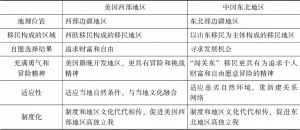论文
“闯关东”和独立我的地区文化
摘要
历史上的自愿拓疆运动会使拓疆地区与对照地区相比有高独立我的地区文化。本研究探索了“闯关东”这一中国历史上的移民自由迁徙事件对东北地区高独立我地区文化的影响。研究采用自我建构量表、自我膨胀任务、“亲亲性”任务、最常见名字的百分比等多种独立我/互依我测量指标,对黑龙江和山东两地的居民进行测量。结果发现,黑龙江地区居民的互依我低于山东地区居民,内群体偏爱程度也低于山东地区居民,自我膨胀程度高于山东地区居民,比山东地区居民更喜欢给孩子起独特的名字。结果说明黑龙江人与山东人在独立我上出现的差异,可能与历史上的“闯关东”运动有关。
作者
白晶莹 ,中国科学院心理研究所硕士研究生,中国科学院大学心理学系。
任孝鹏 ,中国科学院心理研究所副研究员,中国科学院大学心理学系。
Bai Jingying
Ren Xiaopeng
检索正文关键字
论文目录
-
一 引言
- (一)个体主义/集体主义
- (二)自愿拓疆假说
- (三)“闯关东”运动
-
二 相关研究
- (一)研究一
- 1.样本
- 2.测量
- 3.对数据的分析
- 4.结果
- 5.讨论
- (二)研究二
- 1.样本
- 2.测量
- 3.结果
- 4.讨论
- (一)研究一
-
三 总讨论
- (一)与其他社会生态因素的比较
- (二)“闯关东”与自愿拓疆运动
- (三)名字与独特性
- 四 结论
相关文献
查看更多>>>






